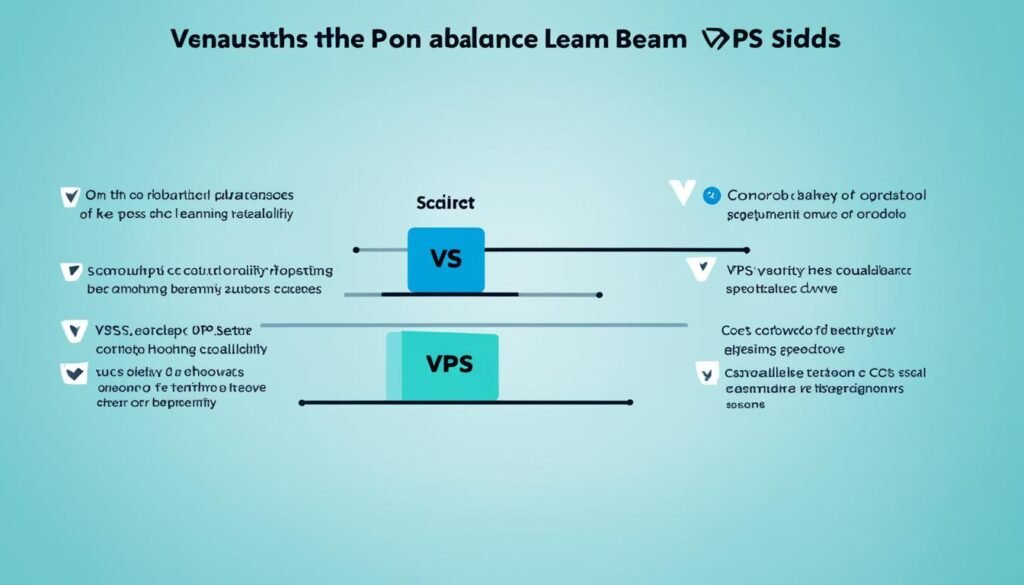Welcome to the essential guide to VPS hosting! If you’re new to the world of web hosting, you may have come across terms like VPS hosting, shared hosting, and dedicated hosting. But what exactly is VPS hosting, and how does it compare to other hosting options? In this guide, we’ll take a closer look at VPS hosting, its benefits, and when it may be the right time to switch to VPS for your website.
Key Takeaways: Essential Guide To VPS Hosting
- VPS hosting provides dedicated resources and better performance compared to shared hosting.
- A virtual private server is a hosting solution that offers an isolated environment within a shared physical server.
- VPS works by using virtualization technology to split a physical server into multiple virtual machines.
- Pros of VPS hosting include cost-effectiveness, customization and control, scalability, and enhanced security.
- VPS hosting falls in between shared hosting and dedicated hosting, offering a balance between affordability and performance.
What Is A Virtual Private Server?
A virtual private server, or VPS, is a hosting solution that provides dedicated resources to a website, offering better performance than shared hosting. With a VPS, your site gets its own isolated environment within a shared physical server, ensuring that the resources such as RAM, CPU power, and data are not shared with other users.
Unlike shared hosting, where multiple websites share the same server resources, a VPS offers dedicated resources exclusively for your website. This means that you have more control over your website’s performance and can handle higher levels of traffic without experiencing lag or slowdowns.
A VPS provides a virtualized environment that mimics the functionality of a dedicated server, but at a more affordable price. It offers the best of both worlds by providing the cost-effectiveness of shared hosting and the performance advantages of dedicated hosting.
With a VPS, you have the flexibility to customize and configure your server settings to suit your specific needs. This level of control allows you to optimize your website’s performance, security, and functionality according to your requirements.
Additionally, a VPS offers enhanced security compared to shared hosting. Since your website operates within its own isolated environment, you are protected from potential security vulnerabilities caused by other websites hosted on the same server.
Whether you have a growing website or require more control over your hosting environment, a virtual private server is an ideal solution. It provides dedicated resources, scalability, customizable server settings, enhanced security, and reliable performance to meet the needs of your website.
How Does A VPS Work?

VPS hosting operates through the utilization of virtualization technology, which allows a physical server to be divided into multiple virtual machines or compartments. Each of these compartments, also known as virtual private servers, operates independently and can have its own operating system, software, and control panel. This enables users to have a personalized hosting environment where the allocated resources are dedicated solely to their website, ensuring optimal performance.
Unlike shared hosting, where multiple websites share the resources of a single server, VPS hosting provides individual compartments that function as separate entities within the physical server. This segregation ensures that each VPS has its own distinct environment, allowing for greater stability, security, and control.
The virtualization technology employed in VPS hosting creates a layer of abstraction between the physical server and the individual compartments, creating an illusion of dedicated resources for each VPS. This allows users to enjoy the benefits of dedicated hosting, such as enhanced performance and the ability to install and configure custom software, without the costs associated with owning and operating a dedicated server.
Each virtual machine within a VPS functions as a self-contained unit, isolated from other compartments on the same server. This isolation ensures that any issues or changes in one VPS do not affect the others, providing a secure and reliable hosting environment.
In summary, VPS hosting leverages virtualization technology to create individual compartments, each with its own operating system, software, and control panel. This allows for a customized hosting environment tailored to the specific needs of the website, providing dedicated resources and enhanced performance.
Example: Typical VPS Setup
| Resource | Description |
|---|---|
| Server Infrastructure | A physical server with high-performance hardware |
| Virtualization Layer | Software that divides the physical server into multiple virtual machines |
| Control Panel | An interface that allows users to manage their VPS, install software, and configure settings |
| Operating System | The software that manages hardware resources and allows users to run applications |
| Software | Applications and scripts installed on the VPS to power websites or web applications |
Pros And Cons Of VPS Hosting

VPS hosting offers several advantages that make it a popular choice for many website owners. Let’s explore the pros of VPS hosting:
- Cost-effectiveness: VPS hosting provides a cost-effective solution, offering dedicated resources at a lower price compared to dedicated hosting.
- Customization and control: With VPS hosting, you have full control over server settings and the ability to customize your hosting environment according to your specific needs and preferences.
- Scalability: VPS hosting allows you to easily scale your resources as your website grows, ensuring that you can handle increasing site traffic without experiencing performance issues.
- Dedicated resources: Unlike shared hosting, VPS hosting provides dedicated resources, including CPU power, RAM, and storage, ensuring reliable performance for your website.
- Enhanced security: VPS hosting offers better security compared to shared hosting since your site is isolated from other websites on the server. You have greater control over security measures and can implement advanced security features to protect your website.
- Support and maintenance: Many VPS hosting providers offer round-the-clock support and maintenance services, ensuring that any technical issues or concerns are promptly addressed.
While VPS hosting has many advantages, it also has some cons that you should consider:
- Technical expertise required: Managing a VPS hosting environment requires some technical knowledge and skills. You’ll need to have a basic understanding of server administration and troubleshooting.
- Resource allocation problems: In some cases, resource allocation on a VPS hosting server may not be evenly distributed, resulting in potential performance issues if one website consumes a significant portion of the available resources.
- Limited hardware control: While you have control over server settings and software, you may have limited control over the physical server hardware since it is shared with other VPS hosting users.
Overall, VPS hosting provides a balance between cost-effectiveness, customization, and performance. It is important to carefully consider the pros and cons to determine if VPS hosting is the right choice for your website.
How VPS Compares With Shared Hosting & Dedicated Hosting

When it comes to hosting your website, you have several options to choose from. Two popular choices are shared hosting and dedicated hosting. However, there is also a middle ground option known as VPS hosting. Let’s explore the differences between these hosting types to help you make an informed decision for your website.
Shared Hosting: Cost-Effective But Limited Resources
Shared hosting is the most affordable option, as it involves multiple websites sharing the same resources on a single server. While this makes it a cost-effective choice, it also means that your website’s performance can be affected by the usage of other sites on the server. You have limited control over server settings, which can restrict the customization and scalability of your website.
VPS Hosting: Dedicated Resources and Greater Control
In contrast, VPS hosting provides dedicated resources within a shared server environment. This means that your website has its own allocated portion of server resources, including CPU power, RAM, and disk space. You have greater control over server settings and can customize your hosting environment to suit the specific needs of your website. VPS hosting offers better performance and scalability compared to shared hosting, making it a suitable choice for growing websites with higher traffic.
Dedicated Hosting: Exclusive Use and Full Control
Dedicated hosting offers the highest level of control and performance. With dedicated hosting, you have a server exclusively for your website, ensuring that you have complete control over server settings and resources. This option is ideal for large businesses or websites with high traffic volumes that require extensive customization and demand full control over their hosting environment.
Now let’s compare the differences between VPS hosting and the other options:
| Hosting Type | Differences |
|---|---|
| Shared Hosting | – Limited resources – Shared server environment – Less control over server settings |
| VPS Hosting | – Dedicated resources within a shared server – Greater control over server settings – Scalability and customization options (image description: VPS Hosting Comparison) |
| Dedicated Hosting | – Exclusive use of a server – Full control over server settings – Highest level of performance and customization |
As you can see, VPS hosting provides a balance between affordability and performance. It offers the benefits of dedicated hosting, such as dedicated resources and greater control, at a lower cost than dedicated hosting. This makes it a popular choice for businesses and websites that require more power, flexibility, and control than shared hosting.
In the next section, we will discuss when it may be time to switch to VPS hosting and provide tips on choosing the best VPS hosting plan for your website.
When Should You Switch To VPS?

If you’ve been experiencing a surge in website traffic, facing resource limitations on your shared hosting plan, or planning to run an online store, it may be time to consider switching to VPS hosting. VPS, or Virtual Private Server, offers advanced security features, improved website performance, and the necessary resources to meet your growing needs.
In an increasingly digital world, the need for advanced security features cannot be understated. Protecting your website and sensitive customer information from potential cyber threats is crucial. VPS hosting provides enhanced security measures, such as dedicated firewalls and isolated server environments, to safeguard your data and ensure peace of mind.
As your website traffic increases, shared hosting may not be able to handle the surge effectively. Traffic spikes can lead to slow loading times and even crashes, resulting in a poor user experience. VPS hosting offers more bandwidth and resources to accommodate higher traffic volumes, guaranteeing a smooth and seamless browsing experience for your visitors.
For e-commerce websites, PCI compliance is essential. VPS hosting enables you to meet the Payment Card Industry Data Security Standard (PCI DSS) requirements, ensuring secure transactions and protecting your customers’ payment information. By switching to VPS, you can confidently run your online store and build trust with your customers.
Resource limitations on shared hosting can hinder your website’s ability to handle increased demands. With VPS hosting, you have access to dedicated resources, including RAM, CPU power, and storage, providing the necessary horsepower to support your growing needs. This ensures optimal performance and minimizes the risk of resource bottlenecks.
If you’re looking for better website performance across the board, VPS hosting is the way to go. Dedicated resources and the ability to customize server settings allow you to optimize your website’s performance, resulting in faster loading times, improved responsiveness, and overall user satisfaction.
When considering the switch to VPS, it’s important to assess your specific requirements and future goals. Whether you’re running an online store, experiencing high traffic, or need advanced security features, VPS hosting offers the scalability and flexibility necessary to support your growing online presence. Make the switch to VPS and unlock the full potential of your website.
Summary:
| Signs indicating it may be time to switch to VPS: | VPS Hosting Benefits: |
|---|---|
| Increased website traffic | Advanced security features |
| Resource limitations on shared hosting | Improved website performance |
| Need for PCI compliance | Dedicated resources |
| Planning to run an online store | Scalability |
How To Choose The Best VPS Hosting Plan For Your Website?
Choosing the right VPS hosting plan for your website is a crucial decision that can significantly impact its performance and success. To ensure you make an informed choice, there are several important factors to consider.
Assess Your Hosting Needs
Start by evaluating your website’s requirements and resources. Consider factors such as your anticipated traffic volume, storage needs, and whether you need specialized features like e-commerce functionality or specific software compatibility.
Compare VPS Hosting Providers
Research and compare different VPS hosting providers to find the one that best meets your needs. Look for reliable companies that offer a range of plans and services. Evaluate factors such as server locations, customer support availability, and the scalability options they provide.
Evaluate Uptime Guarantees
Uptime guarantees are critical in ensuring your website remains accessible to visitors. Look for hosting providers that offer high uptime guarantees, ideally above 99.9%. This ensures that your website will experience minimal downtime, allowing for consistent user experience.
Consider Customer Reviews
Take the time to read customer reviews and testimonials of different VPS hosting providers. Pay attention to feedback related to customer support quality, server performance, and overall satisfaction. This will give you valuable insights into the experiences of other users.
Configuring Your VPS Server
Once you have chosen a VPS hosting plan, it’s crucial to properly configure your server. Optimize your server settings, install necessary software, and set up security measures to ensure smooth and secure website operations.
Making a Data Backup
Prior to migrating from shared hosting to a VPS, make sure to create a complete backup of your website data. This ensures that in case of any unforeseen issues or data loss during the migration process, you can easily restore your website to its previous state.
To summarize, when choosing a VPS hosting plan, assess your hosting needs, research and compare providers, evaluate uptime guarantees, consider customer reviews, configure your VPS server properly, and make a complete data backup. By following these steps, you can select the best VPS hosting plan that aligns with your website’s requirements and goals.
Ready for Your Own VPS Hosting?

Are you looking for a hosting solution that offers improved website performance, scalability, and cost-effectiveness? Look no further than VPS hosting. With VPS hosting, you can enjoy the benefits of a virtual server, including customization and control over server settings, enhanced security features, and support and maintenance options.
VPS hosting provides a cost-effective solution for websites that have outgrown shared hosting. Unlike shared hosting, where resources are shared among multiple websites, VPS hosting offers dedicated resources, ensuring optimal website performance. This means that your website will load faster and handle increased traffic more efficiently, leading to a better user experience for your visitors.
Furthermore, VPS hosting allows for customization and control over server settings. You have the freedom to install and configure software that is specific to your website’s needs. Whether you require a specific operating system, database, or control panel, VPS hosting gives you the flexibility to tailor your server environment accordingly.
Scalability is another advantage of VPS hosting. As your website grows, you can easily scale up your resources to meet the increasing demands. Whether it’s expanding your server storage, adding more RAM, or increasing CPU power, VPS hosting allows you to scale your server resources without any downtime or disruption to your website.
When it comes to security, VPS hosting provides enhanced features to protect your website and its data. With isolated server compartments, you are shielded from the vulnerabilities of neighboring websites. Additionally, VPS hosting often includes advanced security measures, such as firewalls, regular backups, and SSL certificates, to keep your website safe from threats.
Support and maintenance are essential aspects of any hosting service. With VPS hosting, you can expect reliable support from your hosting provider. They can assist you with server configurations, troubleshooting, and ensuring the smooth operation of your VPS. Regular maintenance and updates are also taken care of, allowing you to focus on growing your website and business.
Ready to take advantage of VPS hosting? Upgrade to VPS hosting today and experience the benefits of improved website performance, scalability, customization and control, enhanced security features, and reliable support and maintenance. It’s a cost-effective solution that provides the resources and flexibility your website needs to thrive.
Key Advantages of VPS Hosting:
- Improved website performance
- Scalability to handle increased traffic
- Cost-effective solution
- Customization and control over server settings
- Enhanced security features
- Reliable support and maintenance
The ultimate guide to virtual private servers (VPS) is essential for those looking to choose the best VPS hosting provider. Unlike shared hosting, VPS hosting provides a virtual private server environment within a physical server, offering faster performance and greater control. Whether you opt for managed VPS hosting plans or prefer unmanaged hosting, understanding the benefits of VPS hosting is crucial. With VPS hosting, you can ensure your hosting needs are met without the high costs of dedicated hosting. Beginners can switch to VPS with ease by learning about the different types of VPS hosting available, such as fully managed, semi-managed, and unmanaged VPS hosting. Managed VPS hosting providers handle server management tasks, while unmanaged VPS hosting requires more technical expertise. Choosing the right VPS hosting control panel and knowing what VPS is suitable for your website, whether it’s for WordPress or other applications, is key. Ultimately, VPS hosting is ideal for those who need a cost-effective solution that offers better performance and control than shared hosting.
When delving into VPS hosting, understanding everything you need to know is crucial. Unlike shared hosting where multiple websites share resources on a single server, VPS hosting provides a virtual private server within a physical server, offering more control and security akin to dedicated hosting but at a more affordable price point. Managed VPS hosting providers handle server management tasks, making it ideal for those without extensive hosting experience, while unmanaged VPS hosting offers more control but requires technical expertise. Whether you opt for Windows VPS or Linux VPS, VPS hosting works by dividing a physical server into multiple virtual machines, each running its own operating system. This hosting option provides security features to protect your data and ensure the smooth operation of your website. With VPS hosting, you have the flexibility to use a VPS as a self-managed solution or rely on a hosting provider to manage the server for you. Ultimately, VPS hosting is a versatile hosting solution that bridges the gap between shared and dedicated hosting, offering a range of hosting plans to suit various needs and hosting environments.
Also Read: Common Misconceptions About Shared Hosting
Conclusion
In this Essential Guide to VPS Hosting, we have explored the benefits and considerations of VPS hosting. VPS hosting offers a middle ground between shared and dedicated hosting, providing dedicated resources and greater control over server configuration. It is a flexible and scalable hosting solution that can meet the needs of various websites.
When choosing VPS hosting, it is important to consider your specific hosting needs. Evaluate factors such as uptime guarantees and customer reviews to ensure the reliability and quality of the hosting provider. By understanding the benefits and considerations of VPS hosting, you can make an informed decision for your website’s hosting.
In conclusion, VPS hosting provides a cost-effective solution for those who require more resources and customization than shared hosting can offer. With dedicated resources and enhanced control, you can optimize your website’s performance and security. Take the time to thoroughly evaluate your hosting needs and select a reputable VPS hosting provider to ensure success in your online endeavors.
FAQs
Q: What is VPS hosting and how is it different from other types of hosting?
A: VPS hosting stands for Virtual Private Server hosting. It is a type of hosting where a physical server is divided into multiple virtual servers, each operating independently. This provides more control, privacy, and resources compared to shared hosting, but is more affordable than dedicated server hosting.
Q: How do I choose a VPS hosting plan that suits my needs?
A: To choose the right VPS plan, consider factors such as your website’s size and traffic, required resources like CPU, RAM, and storage, level of technical expertise, budget, and any specific software or applications you need to run.
Q: What is the difference between VPS hosting and dedicated server hosting?
A: In VPS hosting, a physical server is divided into multiple virtual servers, while dedicated server hosting provides you with an entire physical server dedicated solely to your website. Dedicated hosting offers more resources and control but comes at a higher cost.
Q: What is unmanaged VPS hosting and is it suitable for me?
A: Unmanaged VPS hosting means you are responsible for managing and maintaining the server yourself, including security, updates, and technical issues. It is recommended for experienced users with the technical knowledge to handle server administration tasks.
Q: How can I choose a VPS hosting provider?
A: When choosing a VPS hosting provider, consider factors such as uptime guarantees, customer support quality, server locations, scalability options, pricing, and user reviews. Look for a provider that meets your specific needs and offers good value for money.
Q: Is VPS hosting faster than shared hosting?
A: Yes, VPS hosting is typically faster and more reliable than shared hosting because you have dedicated resources allocated to your virtual server. This means better performance, especially for websites with higher traffic or resource demands.
Q: What is semi-managed VPS hosting and how does it differ from managed or unmanaged hosting?
A: Semi-managed VPS hosting is a middle-ground option where the hosting provider takes care of certain server management tasks, such as hardware and infrastructure maintenance, while you are responsible for software installations and configurations. It offers a balance between control and support.




